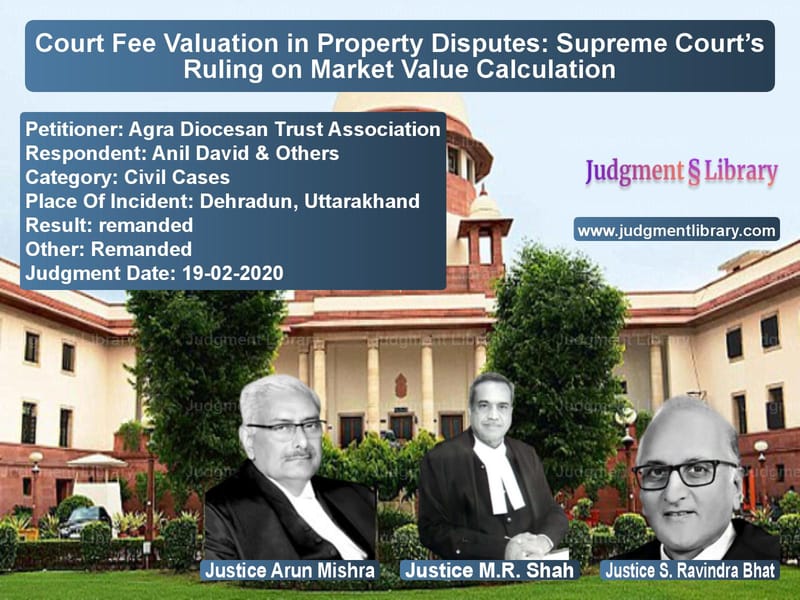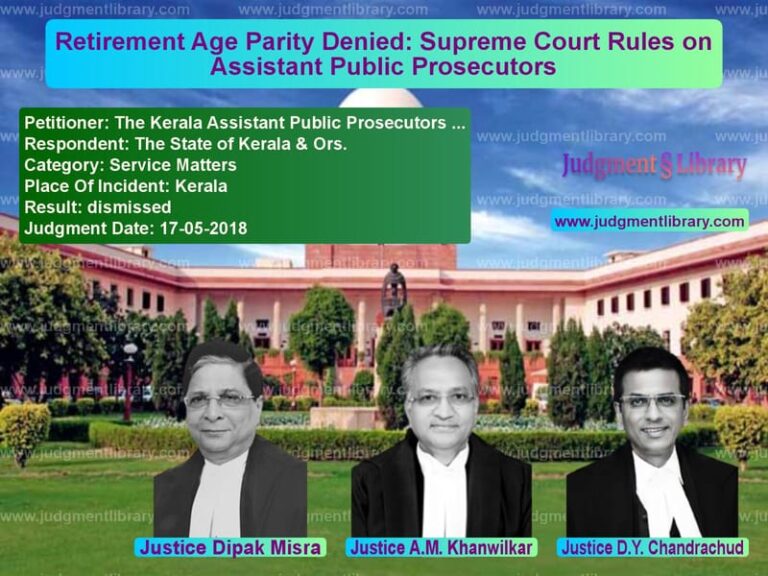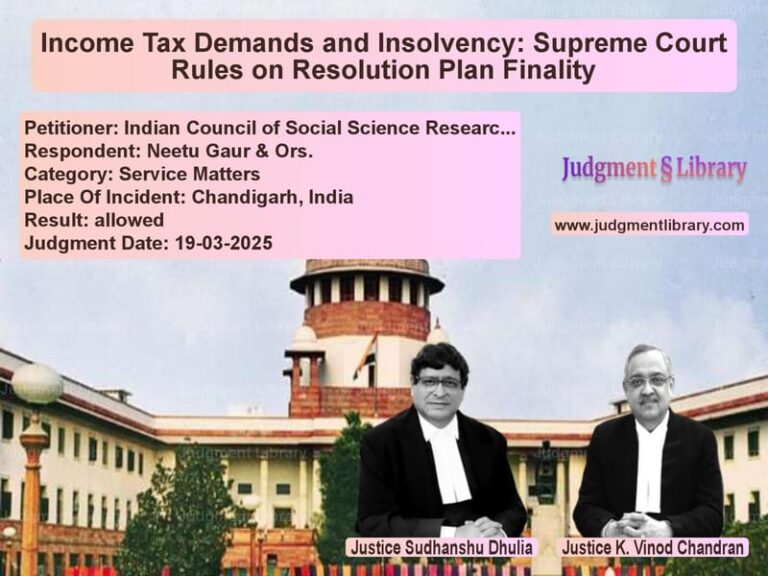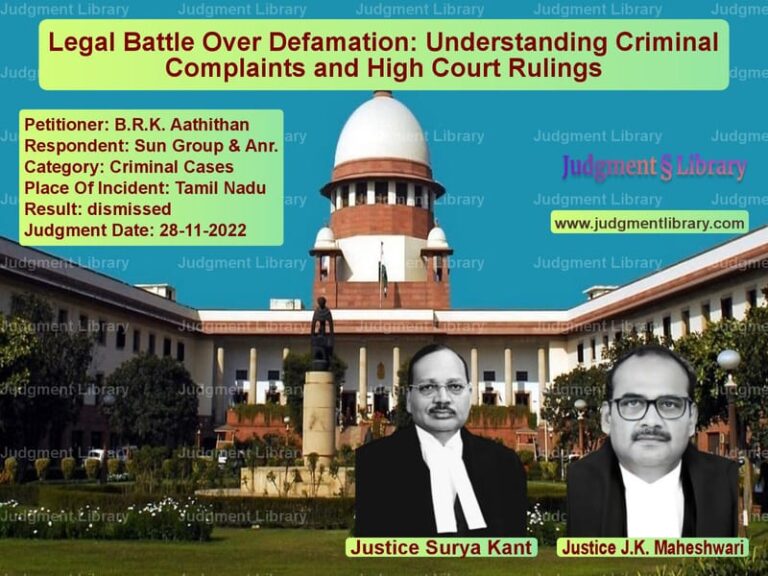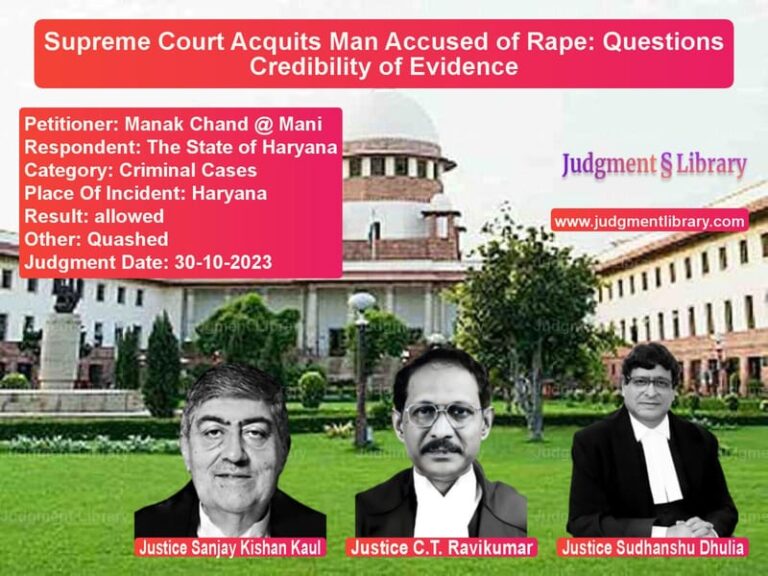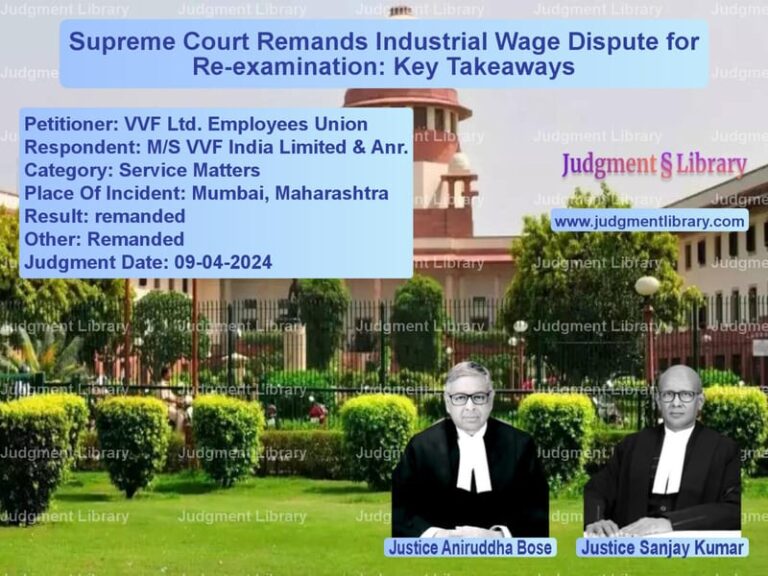Court Fee Valuation in Property Disputes: Supreme Court’s Ruling on Market Value Calculation
The Supreme Court of India, in the case of Agra Diocesan Trust Association v. Anil David & Others, addressed a dispute concerning the correct valuation of a property for court fee purposes. The ruling focused on whether the market value of the property should be determined based on revenue records or the circle rate fixed by the Collector for stamp duty.
Background of the Case
The appellant, Agra Diocesan Trust Association, filed two civil suits before the Dehradun Civil Judge (Senior Division) seeking the cancellation of sale deeds dated March 8, 2013, executed by the respondent, Anil David. The suits also sought a permanent injunction to restrain the respondents from interfering in the appellant’s possession of the disputed property.
The respondents challenged the suit valuation and court fee paid by the appellant, arguing that the suits were under-valued. The trial court ruled against the appellant, stating that the suits should have been valued based on the market value of the land as per the Collector’s circle rate. The appellant then approached the High Court of Uttarakhand, which upheld the trial court’s decision.
Key Legal Issues
- Should the court fee be calculated based on circle rates fixed for stamp duty purposes or revenue records?
- Did the High Court err in directing the appellant to pay ad valorem court fees?
- What is the correct interpretation of Section 7(iv-A) of the Court Fees Act, 1870?
Arguments by the Parties
Arguments by the Appellant (Agra Diocesan Trust Association)
- The land in dispute was agricultural land, and court fees should be paid based on revenue records, not circle rates.
- The appellant was not a party to the sale deed and should pay court fees based on one-fifth of the market value, as per Section 7(iv-A) of the Court Fees Act.
- The High Court failed to consider that the circle rate is meant for stamp duty purposes and does not necessarily reflect actual market value.
Arguments by the Respondents (Anil David & Others)
- The Collector’s circle rate is the best indicator of market value and should be used for court fee calculation.
- The appellant arbitrarily undervalued the suit property and paid an insufficient court fee.
- The valuation provided by the appellant was inconsistent—valuing the property at Rs. 2,00,00,000 for jurisdiction but at Rs. 3,000 for court fee purposes.
Supreme Court’s Observations
The Supreme Court, comprising Justices Arun Mishra, M.R. Shah, and S. Ravindra Bhat, examined the applicable legal principles and precedents before delivering its judgment.
1. Market Value Determination
The Court clarified that market value for court fee purposes must be computed as per Section 7(iv-A) of the Court Fees Act. It observed:
“The concept of market value in stamp duty laws does not automatically translate into market value for court fee calculation. The two serve distinct legal purposes.”
2. Distinction Between Stamp Duty and Court Fee
The Court held that the Collector’s circle rate is not conclusive proof of market value. It noted:
“Market value under Section 7(iv-A) must be determined based on the revenue records unless proven otherwise. Courts should not presume that circle rates are the only valid measure.”
3. Judicial Precedents Considered
The Court referred to past judgments, including:
- Suhrid Singh v. Randhir Singh (2010) 12 SCC 112 – Differentiating between declaratory relief and cancellation of documents for court fee purposes.
- Shailendra Bhardwaj v. Chandra Pal (2013) 1 SCC 579 – Emphasizing that market value should be determined based on the actual nature of the land.
4. Remand for Fresh Consideration
The Supreme Court found that the High Court had not adequately considered the revenue records in determining the correct valuation. It ruled:
“The question of market value based on revenue payable must be tried in the suit. A blanket reliance on the Collector’s circle rate is improper.”
Final Judgment
The Supreme Court set aside the High Court’s order and remanded the case for fresh adjudication, directing that:
- The trial court must determine the correct valuation based on revenue records.
- The appellant’s claim regarding agricultural land classification must be examined.
- The issue of one-fifth valuation under Section 7(iv-A) must be considered properly.
Key Takeaways
- Circle rates are not the sole basis for court fee valuation; revenue records must be considered.
- Stamp duty and court fee calculations serve different legal purposes and must be treated separately.
- Market value disputes require evidence, and courts must examine all relevant factors before determining valuation.
- Remanding cases ensures fairness and prevents arbitrary assessments of court fees.
Conclusion
The Supreme Court’s ruling in Agra Diocesan Trust Association v. Anil David & Others is a landmark decision that clarifies how court fees should be assessed in property disputes. By rejecting a blanket reliance on Collector’s circle rates, the judgment ensures fair treatment of litigants and upholds the principle that revenue records play a crucial role in determining market value for legal proceedings.
Petitioner Name: Agra Diocesan Trust Association.Respondent Name: Anil David & Others.Judgment By: Justice Arun Mishra, Justice M.R. Shah, Justice S. Ravindra Bhat.Place Of Incident: Dehradun, Uttarakhand.Judgment Date: 19-02-2020.
Don’t miss out on the full details! Download the complete judgment in PDF format below and gain valuable insights instantly!
Download Judgment: Agra Diocesan Trust vs Anil David & Others Supreme Court of India Judgment Dated 19-02-2020.pdf
Direct Downlaod Judgment: Direct downlaod this Judgment
See all petitions in Property Disputes
See all petitions in Contract Disputes
See all petitions in Damages and Compensation
See all petitions in Judgment by Arun Mishra
See all petitions in Judgment by Mukeshkumar Rasikbhai Shah
See all petitions in Judgment by S Ravindra Bhat
See all petitions in Remanded
See all petitions in Remanded
See all petitions in supreme court of India judgments February 2020
See all petitions in 2020 judgments
See all posts in Civil Cases Category
See all allowed petitions in Civil Cases Category
See all Dismissed petitions in Civil Cases Category
See all partially allowed petitions in Civil Cases Category

